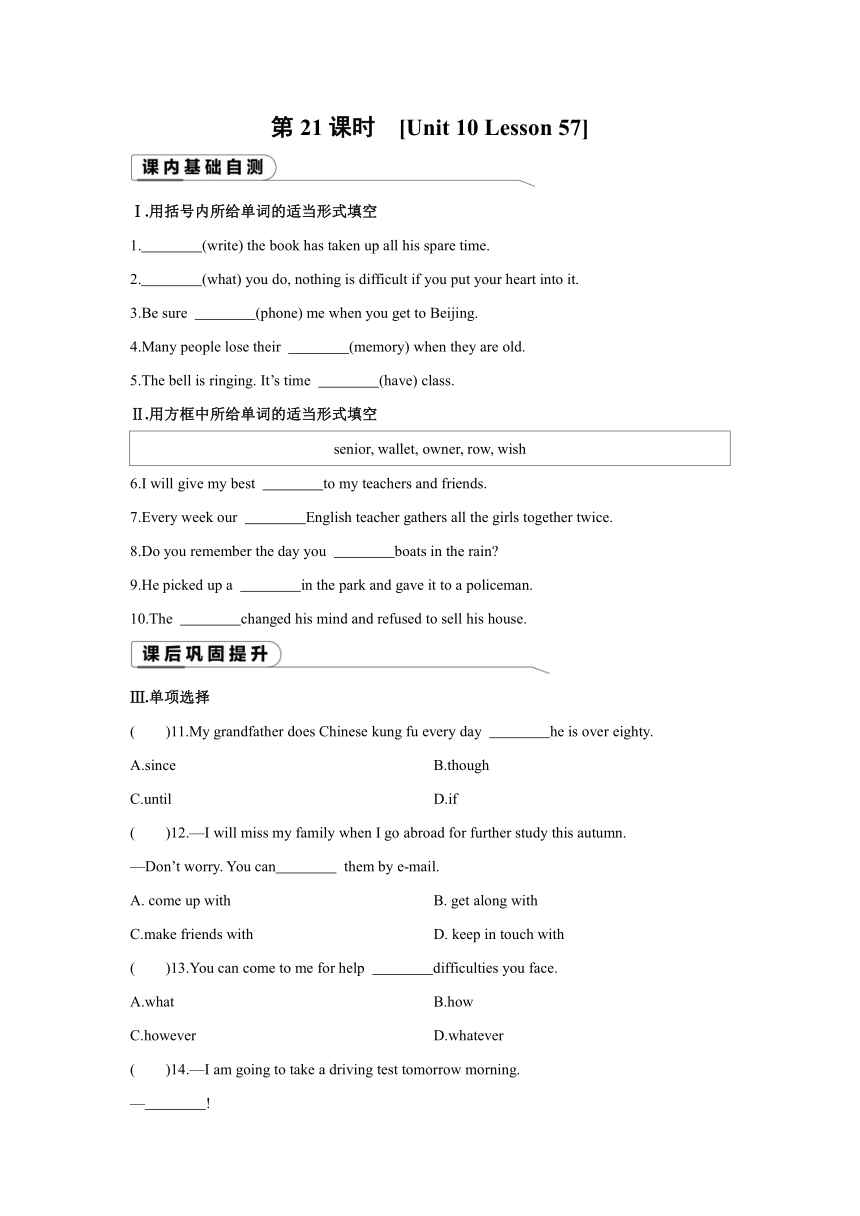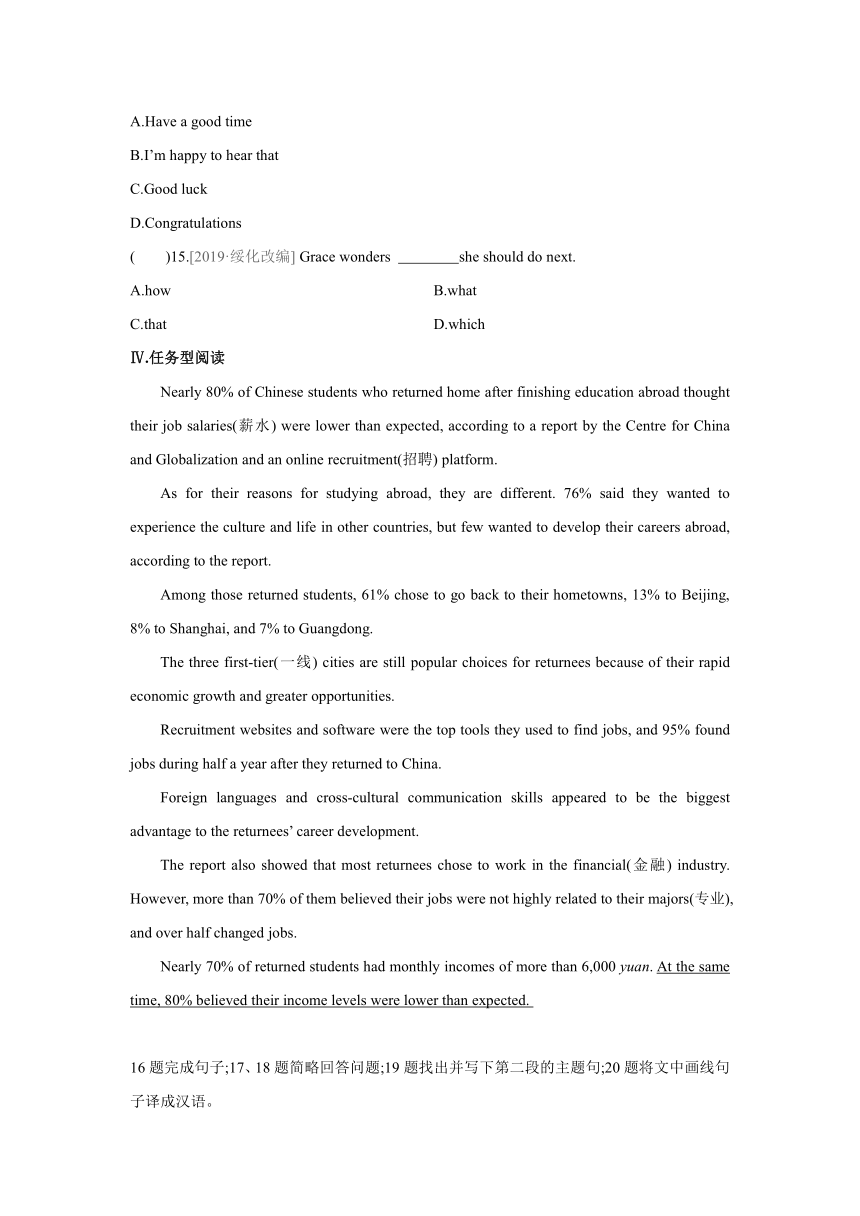冀教版英语 九年级下册 课课练 Unit 10 Lesson 57 Best Wishes.(含答案)
文档属性
| 名称 | 冀教版英语 九年级下册 课课练 Unit 10 Lesson 57 Best Wishes.(含答案) |  | |
| 格式 | docx | ||
| 文件大小 | 54.8KB | ||
| 资源类型 | 教案 | ||
| 版本资源 | 冀教版 | ||
| 科目 | 英语 | ||
| 更新时间 | 2022-07-20 16:43:55 | ||
图片预览


文档简介
第21课时 [Unit 10 Lesson 57]
Ⅰ.用括号内所给单词的适当形式填空
1. (write) the book has taken up all his spare time.
2. (what) you do, nothing is difficult if you put your heart into it.
3.Be sure (phone) me when you get to Beijing.
4.Many people lose their (memory) when they are old.
5.The bell is ringing. It’s time (have) class.
Ⅱ.用方框中所给单词的适当形式填空
senior, wallet, owner, row, wish
6.I will give my best to my teachers and friends.
7.Every week our English teacher gathers all the girls together twice.
8.Do you remember the day you boats in the rain
9.He picked up a in the park and gave it to a policeman.
10.The changed his mind and refused to sell his house.
Ⅲ.单项选择
( )11.My grandfather does Chinese kung fu every day he is over eighty.
A.since B.though
C.until D.if
( )12.—I will miss my family when I go abroad for further study this autumn.
—Don’t worry. You can them by e-mail.
A. come up with B. get along with
C.make friends with D. keep in touch with
( )13.You can come to me for help difficulties you face.
A.what B.how
C.however D.whatever
( )14.—I am going to take a driving test tomorrow morning.
— !
A.Have a good time
B.I’m happy to hear that
C.Good luck
D.Congratulations
( )15.[2019·绥化改编] Grace wonders she should do next.
A.how B.what
C.that D.which
Ⅳ.任务型阅读
Nearly 80% of Chinese students who returned home after finishing education abroad thought their job salaries(薪水) were lower than expected, according to a report by the Centre for China and Globalization and an online recruitment(招聘) platform.
As for their reasons for studying abroad, they are different. 76% said they wanted to experience the culture and life in other countries, but few wanted to develop their careers abroad, according to the report.
Among those returned students, 61% chose to go back to their hometowns, 13% to Beijing, 8% to Shanghai, and 7% to Guangdong.
The three first-tier(一线) cities are still popular choices for returnees because of their rapid economic growth and greater opportunities.
Recruitment websites and software were the top tools they used to find jobs, and 95% found jobs during half a year after they returned to China.
Foreign languages and cross-cultural communication skills appeared to be the biggest advantage to the returnees’ career development.
The report also showed that most returnees chose to work in the financial(金融) industry. However, more than 70% of them believed their jobs were not highly related to their majors(专业), and over half changed jobs.
Nearly 70% of returned students had monthly incomes of more than 6,000 yuan. At the same time, 80% believed their income levels were lower than expected.
16题完成句子;17、18题简略回答问题;19题找出并写下第二段的主题句;20题将文中画线句子译成汉语。
16.The returned students used recruitment websites and software to .
17.What cities are still popular choices for those returnees
18.What field did most returnees choose to work in
19.
20.
答案
课内基础自测
Ⅰ.1.Writing 2.Whatever 3.to phone 4.memories 5.to have
Ⅱ.6.wishes 7.senior 8.rowed 9.wallet 10.owner
课后巩固提升
Ⅲ.11.B
12.D 短语辨析。come up with意为“想出”;get along with意为“与……相处”;make friends with意为“和……交朋友”;keep in touch with意为“与……保持联系”。由句意可知选D。
13.D 句意:无论你面对什么困难,你都可以来找我帮忙。whatever=no matter what(无论什么),引导状语从句,在句中作主语、宾语或表语。动词face后缺少宾语,故用whatever来引导。
14.C
15.B 宾语从句的引导词。how意为“怎样”;what意为“什么”;that没有实际意义;which意为“哪一个”。结合句意“Grace想知道她下一步应该做 ”可知选B。
Ⅳ.16.find jobs
17.The three first-tier cities.
18.The financial industry.
19.As for their reasons for studying abroad, they are different.
20.同时,百分之八十的留学生认为他们的收入低于预期。
Ⅰ.用括号内所给单词的适当形式填空
1. (write) the book has taken up all his spare time.
2. (what) you do, nothing is difficult if you put your heart into it.
3.Be sure (phone) me when you get to Beijing.
4.Many people lose their (memory) when they are old.
5.The bell is ringing. It’s time (have) class.
Ⅱ.用方框中所给单词的适当形式填空
senior, wallet, owner, row, wish
6.I will give my best to my teachers and friends.
7.Every week our English teacher gathers all the girls together twice.
8.Do you remember the day you boats in the rain
9.He picked up a in the park and gave it to a policeman.
10.The changed his mind and refused to sell his house.
Ⅲ.单项选择
( )11.My grandfather does Chinese kung fu every day he is over eighty.
A.since B.though
C.until D.if
( )12.—I will miss my family when I go abroad for further study this autumn.
—Don’t worry. You can them by e-mail.
A. come up with B. get along with
C.make friends with D. keep in touch with
( )13.You can come to me for help difficulties you face.
A.what B.how
C.however D.whatever
( )14.—I am going to take a driving test tomorrow morning.
— !
A.Have a good time
B.I’m happy to hear that
C.Good luck
D.Congratulations
( )15.[2019·绥化改编] Grace wonders she should do next.
A.how B.what
C.that D.which
Ⅳ.任务型阅读
Nearly 80% of Chinese students who returned home after finishing education abroad thought their job salaries(薪水) were lower than expected, according to a report by the Centre for China and Globalization and an online recruitment(招聘) platform.
As for their reasons for studying abroad, they are different. 76% said they wanted to experience the culture and life in other countries, but few wanted to develop their careers abroad, according to the report.
Among those returned students, 61% chose to go back to their hometowns, 13% to Beijing, 8% to Shanghai, and 7% to Guangdong.
The three first-tier(一线) cities are still popular choices for returnees because of their rapid economic growth and greater opportunities.
Recruitment websites and software were the top tools they used to find jobs, and 95% found jobs during half a year after they returned to China.
Foreign languages and cross-cultural communication skills appeared to be the biggest advantage to the returnees’ career development.
The report also showed that most returnees chose to work in the financial(金融) industry. However, more than 70% of them believed their jobs were not highly related to their majors(专业), and over half changed jobs.
Nearly 70% of returned students had monthly incomes of more than 6,000 yuan. At the same time, 80% believed their income levels were lower than expected.
16题完成句子;17、18题简略回答问题;19题找出并写下第二段的主题句;20题将文中画线句子译成汉语。
16.The returned students used recruitment websites and software to .
17.What cities are still popular choices for those returnees
18.What field did most returnees choose to work in
19.
20.
答案
课内基础自测
Ⅰ.1.Writing 2.Whatever 3.to phone 4.memories 5.to have
Ⅱ.6.wishes 7.senior 8.rowed 9.wallet 10.owner
课后巩固提升
Ⅲ.11.B
12.D 短语辨析。come up with意为“想出”;get along with意为“与……相处”;make friends with意为“和……交朋友”;keep in touch with意为“与……保持联系”。由句意可知选D。
13.D 句意:无论你面对什么困难,你都可以来找我帮忙。whatever=no matter what(无论什么),引导状语从句,在句中作主语、宾语或表语。动词face后缺少宾语,故用whatever来引导。
14.C
15.B 宾语从句的引导词。how意为“怎样”;what意为“什么”;that没有实际意义;which意为“哪一个”。结合句意“Grace想知道她下一步应该做 ”可知选B。
Ⅳ.16.find jobs
17.The three first-tier cities.
18.The financial industry.
19.As for their reasons for studying abroad, they are different.
20.同时,百分之八十的留学生认为他们的收入低于预期。
同课章节目录
- Unit 7 Work for Peace
- Lesson 37 Don't Fight!
- Lesson 38 Making School a Better Place
- Lesson 39 The Dove and the Olive Branch
- Lesson 40 The UN—Power of Words
- Lesson 41 Jenny's Good Advice
- Lesson 42 Peace at Last
- Unit Review
- Unit 8 Culture Shapes Us
- Lesson 43 A Visit to Chinatown
- Lesson 44 Popular Sayings
- Lesson 45 Different Manners
- Lesson 46 Home to Many Cultures
- Lesson 47 Good Manners
- Lesson 48 Supper with the Bradshaws
- Unit Review
- Unit 9 Communication
- Lesson 49 Get Along with Others
- Lesson 50 Tips for Good Communication
- Lesson 51 What Could Be Wrong?
- Lesson 52 The Power of a Smile
- Lesson 53 Working in Groups
- Lesson 54 How Embarrassing!
- Unit Review
- Unit 10 Get Ready for the Future
- Lesson 55 Look into the Future
- Lesson 56 Manage Your Time
- Lesson 57 Best Wishes
- Lesson 58 Ms.Liu's Speech
- Lesson 59 Keep Your Choices Open
- Lesson 60 Get a Good Education
- Unit Review
